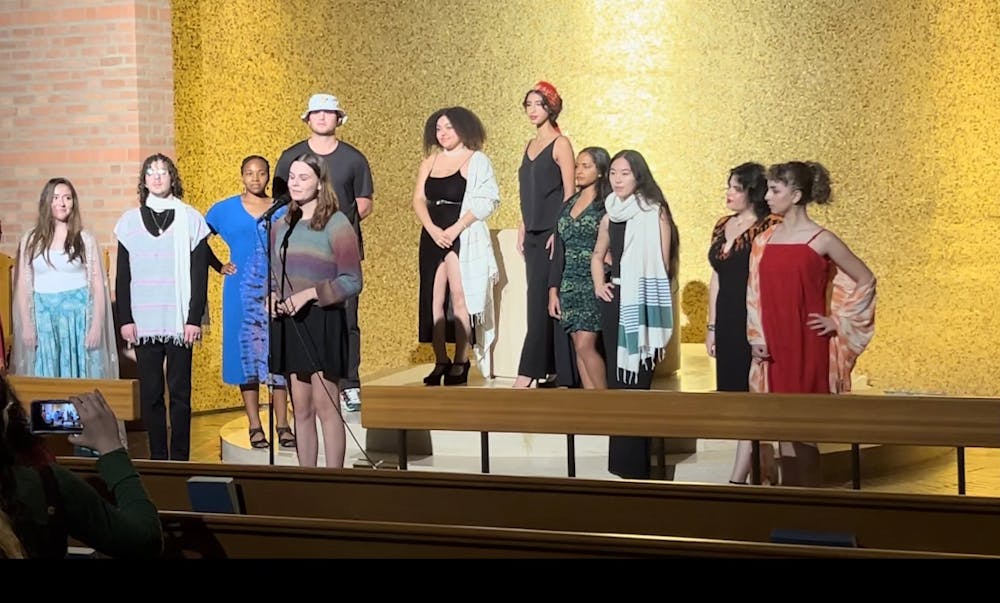IJM fashion show fundraises to stop human trafficking

Eleven student models took the stage for the International Justice Mission’s Interwoven: Celebrating Resistance & Resilience to Trafficking fashion show Nov. 11 at the Rice Memorial Chapel. The models showcased garments ranging from an English trenchcoat to a scarf made in Rwanda. All proceeds were donated to the IJM field office in Ghana, according to Rice IJM president Sarah Sowell.
Sowell concluded the event with a speech urging the audience to support the end of human trafficking and modern slavery. She said that more than 50 million people are currently enslaved, more than in any recorded historical period.
“IJM at Rice is a chapter of the world’s largest anti modern slavery organization,” Sowell, a Jones College senior, said in an interview with the Thresher.
IJM is a non-governmental faith-based organization that aims to eradicate modern slavery and rehabilitate survivors. According to their website, IJM has 31 program offices in 16 countries. Sowell said that Rice IJM exists to aid the organization’s global mission through the university’s sphere of influence.
“We do that in three ways,” Sowell said. “First, by praying for an end [to human trafficking] … The executive team is really mobilized by our Christian faith. Next we do advocacy. Last month, two members of our club and I went to Washington D.C., and we advocated for a child online privacy bill. We also have done some advocacy work in Texas.”
Finally, Sowell said Rice IJM engages in fundraising.
“Our chapter supports a field office of IJM that works to provide intervention and aftercare to boys who have been trafficked in the Lake Volta region of Ghana in the fishing industry,” Sowell said. “The fishing boats have complicated nets with really tight knots, so little boys are the best at untying these knots. There’s an estimated 1,000 boys who are trafficked in this industry, and our chapter gives all our money towards finding textbooks for them, providing medical care [and] paying their teachers.”
While initially the fashion show aimed to highlight clothing made by survivors, Sowell said she shifted the focus toward the larger social organizations that work to prevent human trafficking. According to Sowell, many of these groups protect the most vulnerable in certain communities, which can be a preventative measure against human trafficking.
“The clothes we have that were created by survivors of trafficking come from RefuSHE, which is an organization that provides working and educational opportunities to those who have been refugees or have been trafficked,” Sowell said.
Textile company GojoBet Collections provided two scarves and one shirt for the show. Designer Holly (Kidist) Staub said the company works with 13 Ethiopian fabric makers, many of whom are single mothers. They aim to protect these women from human trafficking by giving them a reliable source of income and a social safety net. Staub said that they are talented artisans who use traditional Ethiopian techniques to produce houseware products. While GojoBet Collections does not make fashion pieces just yet, it is something that Staub said she is looking into.
Jones College junior Daniela Najmias wore a hand-dyed Sri Lankan dress for the fashion show. She said she was grateful for the opportunity to model for a cause.
“I’ve always grown [up] around fashion and art. My aunt is a fashion designer, and my grandma is an artist,” Najmias said.
Although it was her first time directly being involved in an IJM event, she said she has been aware of the chapter for some time. Following her experience, Najmias said she is interested in becoming more involved in the future.
By hosting fundraising events like Interwoven, Sowell said that she hopes to inspire more students to get involved with anti-trafficking advocacy.
“If I could tell Rice students anything about human trafficking, it’s that it is an issue that connects to everything you care about,” Sowell said. “Climate change makes human trafficking worse. Gendered violence, domestic violence and sexual harassment [are] all part of a system that ultimately leads to human trafficking.”
More from The Rice Thresher

Rice to support Harvard in lawsuit against research funding freeze
Rice, alongside 17 other research universities, filed an amicus curiae brief in support of Harvard University’s lawsuit against the Trump administration over more than $2 billion in frozen research grants.

Mayor Whitmire discusses ‘the state of Houston’ between audience protests at Baker Institute
John Whitmire’s remarks on the city’s budget, transportation and infrastructure were interrupted twice by shouts from audience members at a Baker Institute event May 29. At the event, which was open to the public, Whitmire spoke about the current state of Houston alongside former county judge Ed Emmett.
Rice reaffirms support for international students after Trump administration targets Harvard
Rice and the Office of International Students and Scholars said in a May 23 email that they are monitoring the Trump administration’s actions towards Harvard to bar the school from enrolling international students. A federal judge temporarily halted the move less than 24 hours later.


Please note All comments are eligible for publication by The Rice Thresher.